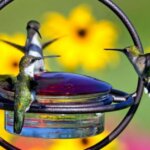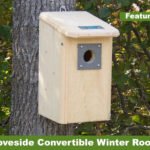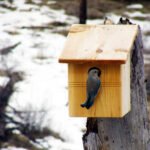
It’s been a frightfully cold start to the new year and a generally cold winter. Even in Southern California, where I spent some of the holidays, the weather was rough.
And you know that if you need to bundle up in your winter coat, a scarf, gloves and several layers of clothes, it’s just as hard for the birds. Fortunately, you have the power to make their lives easier.
Here are four things you can do to help birds through the winter.
1. Keep your feeders full
This one seems pretty obvious, but it’s absolutely important to always have food in your feeders. If during the summer, you check the levels of food in your feeder infrequently, you should check it much more often during the winter. Food becomes scarcer and takes much more energy to find when it’s cold or after a storm. So when a bird flies into your feeder and can get a nice meal, it makes a huge difference. Simply ensuring your feeder always has some amount of food in it will help them a lot.
2. Offer food that is high in calories
One of the ways birds are able to stay warm is by building up their fat reserves, which sees them through cold nights. They do this by eating food high in calories. While there are many different types of food that get the job done, the most effective by far is the black oil sunflower seed. Not only are these seeds nutritious to birds, but a wide variety of species will eat them.
Another option is suet, which is high in calories and attracts birds that don’t eat seeds.
3. Don’t forget water!
Even though food is an important key for birds, don’t forget to also make water readily available. Just like food, water becomes scarcer during colder weather because it can freeze over. Providing fresh water every day will keep your backyard birds hydrated and attract species that might not normally come to your feeder. If the air is particularly frigid in your area and your water is constantly freezing, consider getting a heated bird bath or replacing the water more frequently.
4. Keep the feeders and food clean
The final quick tip for winter bird feeding covers a different aspect. Sometimes rain or snow can cause the seed inside the feeder to become wet. This is problematic because it can cause bacteria or mold to grow in the feeder, which is detrimental to a bird’s health. It might be hard to brave the cold to go out and clean the feeders, but it’s important to make sure the birds are safe from harmful bacteria.




4 Comments
Please note that when it’s extremely cold, do NOT put out heated water source as it can kill the birds if they take a bath in it and then fly away. For example, if it’s -20F. Please use common sense at all times on providing water.
I live in Lancaster, PA (south eastern part of the State) I need to know what you think is the best water supply for my area? (for my Bird friends, of course) Thanks!
I actually take the discarded Christmas trees after the holiday season and use for ground cover. The birds love it !!!